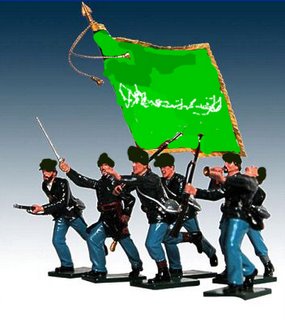
With a little work, you can convert your
Civil War minatures into Iraqi Civil
War minatures.
Civil war in Iraq?
While the world watches Lebanon, in Iraq there's growing fear of a 'full-scale conflict.'
By Tom Regan | csmonitor.com
Maybe if we start depicting the Shia and Sunni as Civil War soldiers, American Civil War soldiers, people might take the hint that there is one in Iraq.While the world has spent the last week and a half focusing on the Israel-Hizbollah conflict, sectarian killings in Iraq have accelerated at an alarming pace, according to Iraqi officials.
The Independent reports that observers in Iraq "fear a level of killing approaching that of Rwanda immediately before the genocide of 1994." The continuing violence has also undermined the authority of the new government.
The failure of the newly formed government of Nouri al-Maliki to stop the mass killings has rapidly discredited it. The Shiite and Sunni militias - in the latter case the insurgents fighting the Americans - are becoming stronger as people look to them for protection. After the explosion in Kufa [where almost 60 people were killed] angry crowds hurled stones at the police demanding that the militiamen of the Mehdi Army, followers of the nationalist cleric Muqtada al-Sadr, take over security in the city. Others chanted at the police – who began to fire in the air to disperse them – "you are traitors!" and accused them of being "American agents."
The rising violence is also reflected in a United Nations Human Rights report on Iraq published earlier this week, which used Health Ministry statistics to determine that 2,669 Iraqi civilians were killed in May and 3,149 in June - an average of more than 100 Iraqis a day. And the violence has increased sharply in July.
The New York Times writes that the UN report "was the most precise measurement of civilian deaths provided by any government organization since the invasion and represented a dramatic increase over daily media reports." In the past, both US and Iraqi officials had been reluctant to give any overall figures for the number of people killed in Iraq.
The surge in attacks has led to leaders of both Sunni and Shiite communities, as well as other Iraqi politicians, to see the violence in a new light. The Los Angeles Times reports that Iraqi officials view the killings of the past two days – more than 130 people – as "a slide into a full-scale conflict."
"The message is clear, and the message confirms the sectarian differences," said Fadhil Sharih, a leader of the Sadr movement. "It seems clear that it's been moving toward the direction of civil war."
US and Iraqi government leaders have argued that the 150,000-strong foreign troop presence has kept the country from descending into full-scale civil war. But many Iraqi officials fear the threshold has been crossed. "What is happening in Iraq is a disaster and a tragedy," Adnan Dulaimi, a Sunni Arab leader, said in an interview. "It's bloodshed and killing of the innocents, killing the elderly and women and children. It's mass killings. It's nothing less than an undeclared civil war."
The Times also reports that other Iraqi politicians who have hesitated to call the rising sectarian killings "civil war" are feeling the need to do so, "in order to borrow the tools and solutions of past civil wars to apply them here ..."
The BBC's Middle East correspondent Roger Harvey reports that many in Iraq now fear that the sectarian killings have taken on a "dynamic of their own," and that Shiites are no longer heeding calls for restraint from their religious leaders.
Surging violence has also led some who have supported the war in Iraq to rethink the situation.
Last Friday, James Hider of The Times of London (which has supported British and American actions in Iraq) reported that, since returning to Iraq after a break of several months, he is convinced that "Baghdad is now verging on total collapse." He writes that his Iraqi staff live in terror of the Sunni and Shiite militias and government troops that roam neighborhoods.
A local journalist told me bitterly this week that Iraqis find it ironic that Saddam Hussein is on trial for killing 148 people 24 years ago, while militias loyal to political parties now in government kill that many people every few days. But it is not an irony that anyone here has time to laugh about. They are too busy packing their bags and wondering how they can get out alive.
No comments:
Post a Comment